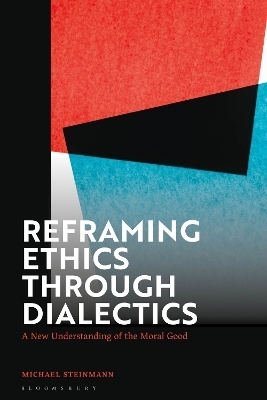
Reframing Ethics Through Dialectics
A New Understanding of the Moral Good
Seiten
2024
Bloomsbury Academic (Verlag)
978-1-350-28692-4 (ISBN)
Bloomsbury Academic (Verlag)
978-1-350-28692-4 (ISBN)
A provocative approach to the possibility of philosophical ethics, this study argues that all moral positions and theories are bound to fail. Using the dialectical tensions inherent to competing moral claims as his starting point, Michael Steinmann explains what he terms the “failure of morality” both in classical and contemporary positions.
As moral claims lead in various ways to contradictions, the history of morality presents itself as an endless series of controversies. By using dialectical thinking, which has gone out of favour in current philosophy, Steinmann shows how we can capture the limitations of moral theories in a more holistic way. Without embracing skepticism about moral claims, a non-naturalistic and non-relativistic understanding of the good emerges as the fundamental notion of moral thought.
Reframing Ethics Through Dialectics reinvigorates the classical notion of “the absolute good” as a fruitful conceptual structure through which to understand competing moral claims, without simply reproducing neo-Aristotelian literature on the good life. From the perspective of the good, the study allows us to take non-traditional theories more seriously, making space for moral philosophy to acknowledge and embrace the contradictions that all positions incur.
As moral claims lead in various ways to contradictions, the history of morality presents itself as an endless series of controversies. By using dialectical thinking, which has gone out of favour in current philosophy, Steinmann shows how we can capture the limitations of moral theories in a more holistic way. Without embracing skepticism about moral claims, a non-naturalistic and non-relativistic understanding of the good emerges as the fundamental notion of moral thought.
Reframing Ethics Through Dialectics reinvigorates the classical notion of “the absolute good” as a fruitful conceptual structure through which to understand competing moral claims, without simply reproducing neo-Aristotelian literature on the good life. From the perspective of the good, the study allows us to take non-traditional theories more seriously, making space for moral philosophy to acknowledge and embrace the contradictions that all positions incur.
Michael Steinmann is Professor of Philosophy at Stevens Institute of Technology, USA.
Acknowledgments
Introduction
Part I: Foundations
1. The Right Beginning
2. Morality as an Exception
3. A Different Type of Notion
4. Expressing the Good
5. The Reality of the Good
Part II: Failures
6. Five Ways of Failing the Good
7. What Moral Theories Try to Achieve
8. The Dialectics of Generality
9. The Dialectics of Reason
10. The Dialectics of Inherent Goodness
Part III: Foolishness
11. Moral Nonetheless
Notes
Bibliography
Index
| Erscheinungsdatum | 16.08.2024 |
|---|---|
| Verlagsort | London |
| Sprache | englisch |
| Maße | 156 x 234 mm |
| Themenwelt | Geisteswissenschaften ► Philosophie ► Erkenntnistheorie / Wissenschaftstheorie |
| Geisteswissenschaften ► Philosophie ► Ethik | |
| Geisteswissenschaften ► Philosophie ► Philosophie der Neuzeit | |
| ISBN-10 | 1-350-28692-3 / 1350286923 |
| ISBN-13 | 978-1-350-28692-4 / 9781350286924 |
| Zustand | Neuware |
| Informationen gemäß Produktsicherheitsverordnung (GPSR) | |
| Haben Sie eine Frage zum Produkt? |
Mehr entdecken
aus dem Bereich
aus dem Bereich
die Grundlegung der modernen Philosophie
Buch | Softcover (2023)
C.H.Beck (Verlag)
CHF 25,20
Buch | Softcover (2023)
Reclam, Philipp (Verlag)
CHF 9,80

![Was heißt Denken?. Vorlesung Wintersemester 1951/52. [Was bedeutet das alles?] - Martin Heidegger](/media/113619842)
